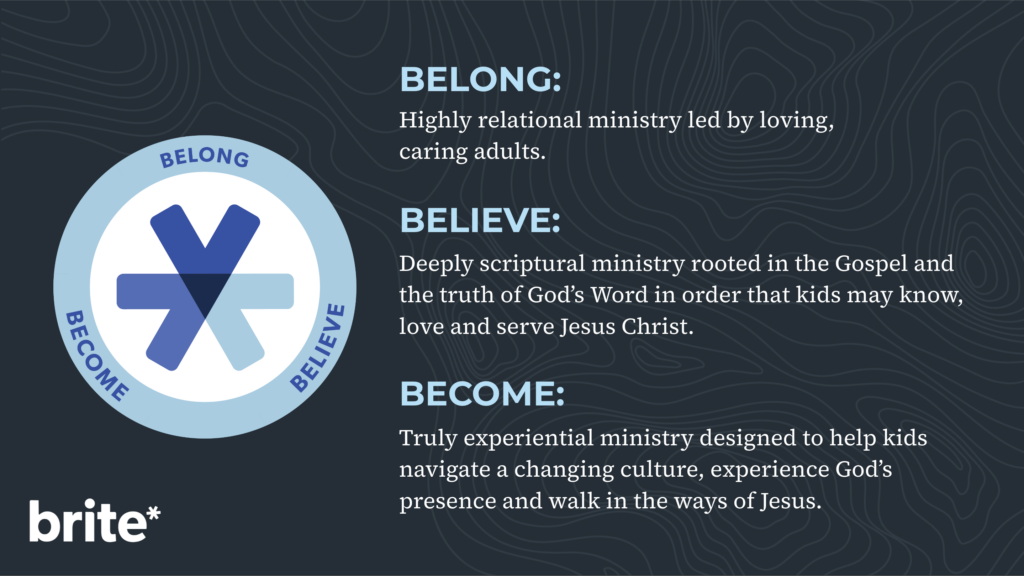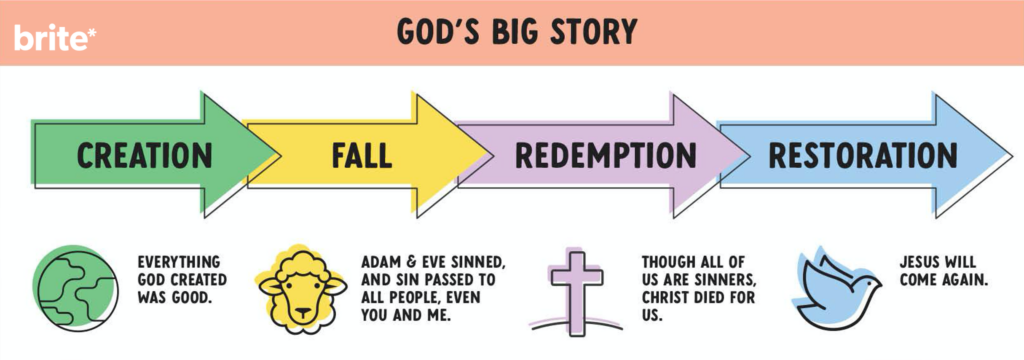This article was written by the Brite* Curriculum Team at Awana. It is a paid promotion.
As children’s ministry leaders, we pray the kids we disciple will follow Jesus for life, not just while they’re in our ministry. Understanding how children learn at each stage — babies, toddlers, preschool, and elementary — will help you share the Gospel and teach the Bible in ways kids can understand and apply to their lives so they can say, “I believe in Jesus. I’m becoming more like Him. I belong to Him forever.”
At Brite™, we’ve found when churches focus on three primary factors at each stage, they are far more fruitful in helping children form faith that lasts a lifetime. Those three factors are belonging, believing and becoming — the 3B ministry philosophy. It’s what Brite, our Gospel-centered curriculum, is built upon!
- Belong is highly relational ministry led by loving, caring adults.
- Believe is deeply scriptural ministry rooted in the Gospel and the truth of God’s Word in order that kids may know, love and serve Jesus Christ.
- Become is truly experiential ministry designed to help kids navigate a changing culture, experience God’s presence and walk in the ways of Jesus.

Read on to learn how to lead babies, toddlers, preschoolers and elementary-age kids to a lasting faith with the 3B ministry philosophy.
Babies & Toddlers
At this beginning stage of development, children are completely dependent on caregivers for their basic needs. Psychologists emphasize the importance of trust in this stage. If a child successfully develops trust, they will feel safe and secure in the world as they continue to grow and develop.
In this age group, discipleship will primarily focus on the first two B’s: belonging and believing. Babies and toddlers need to develop a sense of security, consistency and trust. As disciplemakers, it’s important for you to create a safe and warm environment that fosters this. In doing so, you are setting the foundation for lasting faith; because when a child feels love, security and trust with their basic needs, they can later transfer that trust and security to their Creator.
Preschoolers
The preschool stage is when the question, “Why?” becomes ever so common. Preschoolers are incredibly curious and question everything that is happening around them. Free play and pretend play aid in the development of problem-solving and allow kids to explore more complex social issues.
Similar to babies and toddlers, discipleship for preschoolers will primarily focus on the first two B’s: belonging and believing. As kids grow, their understanding of foundational spiritual truths will grow. John Westerhoff, who once taught at Harvard, wrote: “Faith grows like the rings of a tree, with each ring adding to and changing the tree somewhat, yet building on that which has grown before.”
Ritual and repetition are important at this age, so don’t be afraid to repeat, repeat, repeat!
Early Elementary: Ages 5–8
During the earlier stages, a child’s interactions centered primarily on caregivers, family members and others in their immediate household. Once they enter school, their realm of social influences increases. During this time, thinking becomes more logical and organized but is still very concrete. Kids tend to struggle with abstract and hypothetical concepts at this point in their development. Things are either right or wrong, great or terrible — without much room in between.
At this age, discipleship will start to expand into all three of the B’s: belonging, believing and becoming. Once you’ve established an environment in which a child feels they belong, you’ve earned the right to be heard. At this stage, you can begin to build on the foundation of God’s goodness and love by teaching kids the whole story of Scripture — in other words, “God’s Big Story.” The Bible tells us one big story with four key parts: creation, the fall, redemption and restoration.

Upper Elementary: 8–12 years old
In upper elementary, kids are heading toward adolescence but aren’t quite there yet. Dr. Michelle Anthony states that kids in this stage desire increased independence from parents and siblings, and an increased desire to be seen as intelligent and knowledgeable. Kids are more logical about concrete things but still struggle with abstract ideas and thinking.
At this stage, we can fully lean into all three B’s, as kids are beginning to learn what it means to live as God’s people. This is also the time to begin challenging kids to think about situations and concepts that aren’t immediately present in their world. When you’ve created a place where kids know they belong, and you’ve consistently opened the Bible to show them what God’s Word says, you can now help kids apply what they’ve learned by giving them opportunities to talk, process and problem-solve. As followers of Jesus, kids can grow in their relationship with God by reading the Bible, talking to Him in prayer, attending church and sharing the good news with others.
By understanding the ages and stages of a child’s development and how these stages impact discipleship, our prayer is that you can help kids belong, believe and become more like Jesus. But remember, you are not taking on this responsibility by yourself. It is God alone who can transform the life of a child.
As you disciple kids, we’re here to serve you with Brite, the Gospel-centered curriculum for babies through elementary. In every Brite lesson, the Bible is read, heard and connected to Jesus in ways kids can understand in their lives. Brite is designed to form lasting faith by helping kids belong to God and His kingdom, believe in Jesus Christ as Lord and Savior, and become like Jesus and walk in His ways through the power of the Holy Spirit.
Try Brite today with a FREE month-long series!

About The Brite Curriculum Team
The Brite curriculum team consists of former children’s ministry leaders who now champion child discipleship by creating tools to equip you. We are passionate about serving alongside you to help kids know, love and serve Jesus for life!






